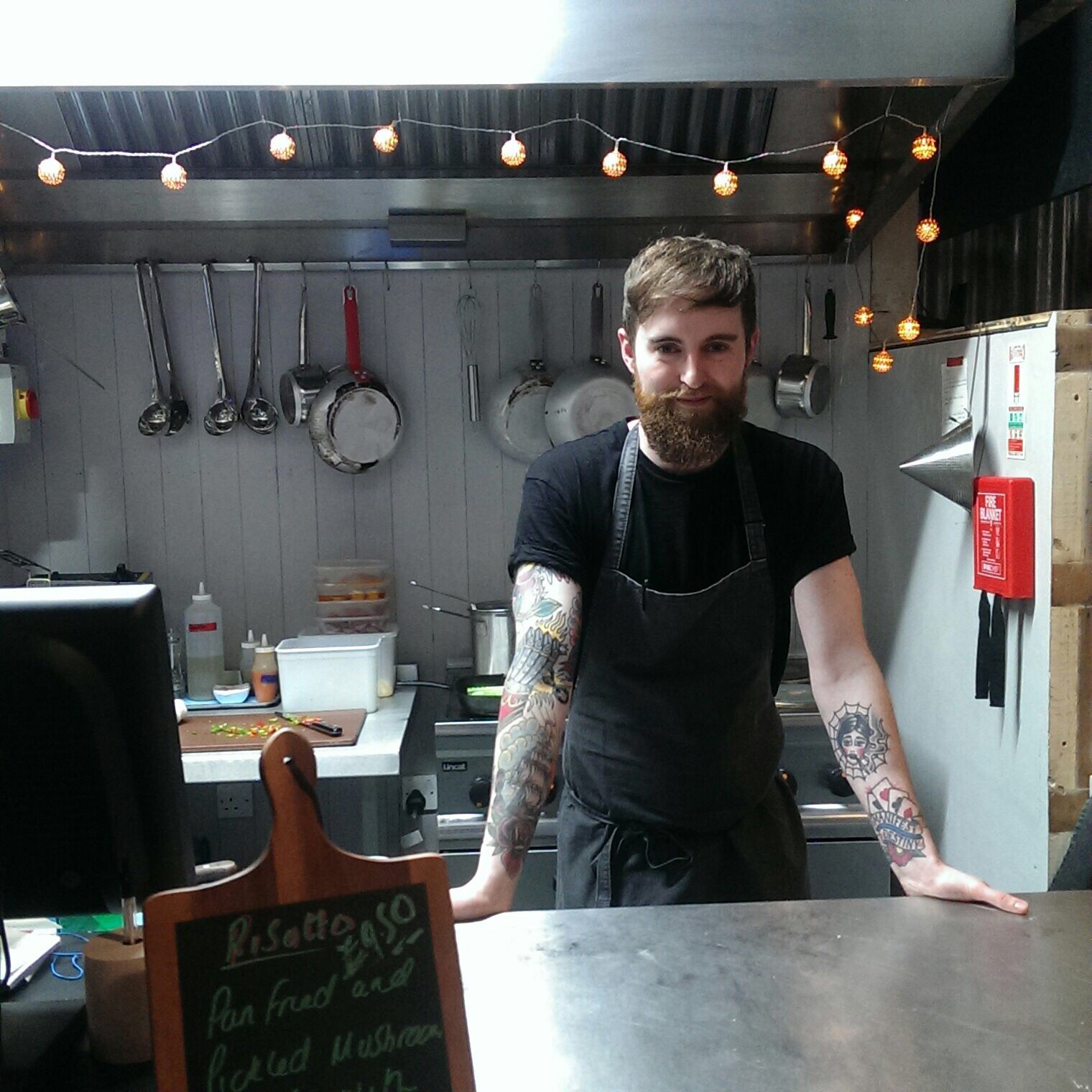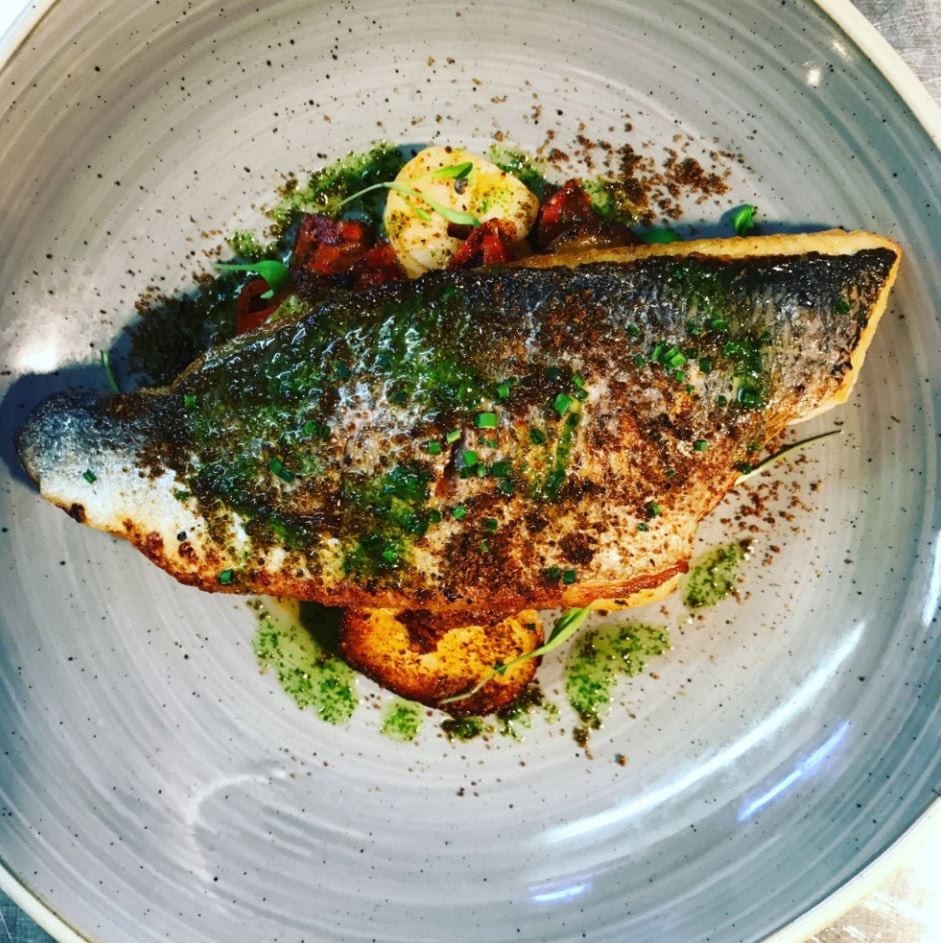When life gives you lemons, make lemonade. This is the cute anecdote which springs to mind when I think of Tom Burton, now head chef at The Palfrey. This beloved restaurant was forced to close last year after being ravaged by fire. Instead of waiting to reopen (the restaurant is currently undergoing extensive refurbishment), The Palfrey is now in residence at The Post House in Derby, where Tom rustles up bistro dishes galore. I chatted to him about Derby’s dining scene, his food journey, and the exciting plans afoot for The Palfrey version 2.0.
What was your first job and how would you describe your food journey since?
My first job in a kitchen was at the Queens Head in Little Eaton, a gastro pub. The head chef at the time – Alex was very knowledgeable and a former navy chef. Alex taught me a lot about kitchen life through his stories and traditional cooking methods. Being self-taught, I’ve had to learn as much as possible from all available sources, be that chefs I work with, television, books or blogs. This has been a journey, that at times has been very testing. However I’ve managed to keep and enhance my passion and love for food.
My food has constantly evolved over the years. I’ve always been interested in trying new things, be it trends or techniques. I believe that as a chef you can’t sit still and rest on your laurels – you must constantly evolve to stay relevant, be that in keeping up with modern trends or being as creative as possible. I hope that’s what I’ve done and will continue to do so.

What does the ‘Head Chef title’ mean to you?
For me the head chef title has several meanings. It is a very difficult, yet rewarding endeavour. As a head chef you need to be a leader, a motivator, a teacher, and a disciplinarian. And that’s just for the staff. On a personal level, to me it is the culmination of years’ of hard work, and a chance to try out some of the things I’ve learnt over the years.
The Palfrey has bounced back from a devastating fire last year, and is now in residency at The Post House. How have you found this transition, from high-end restaurant to super casual dining?
It’s been a complete change from what any of us are used to doing, it’s taken a bit of getting used to, especially having complete interaction with the public! It has however been a very good learning experience for the whole team, chefs serving customers and bar men learning to cook. I think it will actually strengthen us as a team and also open up some other avenues in the future, such as taking The Palfrey on the road.
You have a passion for fresh seafood. What can we expect more of when The Palfrey returns to its original abode?
I absolutely love seafood, everything from its diversity to the extra skill involved in cooking it. This stretches back to the first kitchen I worked in, where I got the chance to put on my own ‘Fish Night’ every Wednesday. I always try to support Hugh Fearnley-Whittingstall’s ethos and consider “Hugh’s Fish Fight” a worthwhile cause, creating fish dishes that use sustainable stocks, highlighting the wide variety oceans have to offer. We always had a diverse range of seafood on the menu so that will be kept in. We will be adding some Scandinavian inspired elements to the menu, plenty of specials to keep our standard menu fresh, as well as offering a monthly taster menu.
How has Scandinavian culture influenced your dishes?
I love the simplicity of Scandinavian dishes, especially the use of quality ingredients and letting these individual components speak for themselves. This is what I’ve tried to base my own menu around, which will be prevalent when we reopen The Palfrey this coming summer. Last but not least the Scandinavian traditional preservation techniques are something I love to use, such as pickling, fermentation and curing.
What are the hallmarks of a good restaurant, and how can The Palfrey stand out from the crowd in the East Midlands?
I believe having great ingredients, flair and creativeness from the chefs coupled with knowledge and a relaxing demeanour from the front of house team will always create a winning combination in any restaurant. Our ethos is one of quality, but in a laid-back atmosphere, we don’t want to go along the traditional method of table cloth draped tables. where people can’t completely relax. Which is why we’ll be offering a laid-back setting, serving fantastic modern food with inspirations from Manchester to South East Asia, along with amazing and inventive cocktails.
Your Victorian Tasting Menu is inspired and unique. Do you have any more tasting menus planned?
Thank you, that has been my favourite up to this point. Before the fire I actually had a taster menu ready to go called “Back to the 80s”. It was a menu inspired by movies, songs and nostalgia from that decade. Obviously with the fire we had to postpone the night! I’m raring to go with it to say the least, so it will be the first taster menu when we relaunch The Palfrey this coming summer.
What do you think about literary luncheons or book-inspired afternoon teas?
I think they are a great idea, I myself love to read and anything that combines two of my favourite things gets my support. I think it’s a good way to get people excited about both food and reading.

How do you want to make diners feel when they tuck into your dishes?
I want them to be excited about taking the next bite. One of the biggest compliments for me is when people think a dish I made is creative.
What inspires you in the kitchen and how long does it take to create a menu (starter, main dessert)?
My inspirations come from different sources. I like to take in as much information as possible from chefs either on television, the Internet or working with them in person. I love to watch Rick Stein travelling the world and trying new cuisines, I always try to pick up something new from this. It really can be anything though, be it a movie or a historical period, because when inspiration strikes, it can be anywhere. Regarding time, it really depends, as some menus can take an hour to write up, whilst others, a few weeks to perfect. I personally like to have a theme with a dish or menu, I find that helps me a lot.
Cookery shows like MasterChef and Saturday Morning with James Martin are game-changers; it is now very fashionable to get creative in the kitchen. What do you think of this cooking / baking revolution?
It’s great for the industry, it really gets people involved in the cooking process. More than ever we have the public coming to the pass to discuss their meal or new trends with us. It does mean everyone is now a critic, but I like to think that keeps us on our toes!
What cooking trends have you encountered this year? Any new ingredients you can tell us about, that you love working with?
Although it’s been trendy for a while, fermentation is my new favourite, I want to add this technique into my cooking at work and at home. Kimchi and kombucha are two examples of this. I’m also trying to minimise waste especially with vegetables, and try to use the full vegetable (root to stem cooking). I’ve just read that West African food is on the tip list for this year; I don’t have any experience cooking it but I’d love to research it more.
What would be your last supper?
Something simple, probably Mexican. A spicy burrito or fajitas with plenty of jalapenos sound great.
Are there any chefs that inspire you, or whom you admire?
At the moment I’d have to say Tommy Banks is someone whom I look up to professionally. Other inspirations include Gary Usher, Nathan Outlaw, Glynn Purnell, Sat Bains and Alex Bond.
Do you own any cookery books?
I own quite a few but my top picks would have to be:
Cracking Yolks & Pig Tales by Glynn Purnell
North: The New Nordic Cuisine of Iceland by Gunnar Karl Gislason
Eleven Madison Park: The Cookbook by Daniel Humm
Donald Trump walks into The Palfrey. What do you serve him?
One of my personal favourite cuisines is Mexican so I’d have to do him an extra extra spicy burrito.
Food critics – are they friend, or foe?
Definitely a friend. In this day and age where a restaurant reputation can be made or lost via the Internet, I think it is important to work with food critics. I think as a chef (although it can be hard to take at times) criticism is what is needed to make you a better cook. So long as its constructive, it can be used to enhance your dishes and also your venue.
If you want to taste Tom’s impressive dishes, or reserve a table at The Palfrey, hop onto website or check out this cool chef’s Instagram now.
